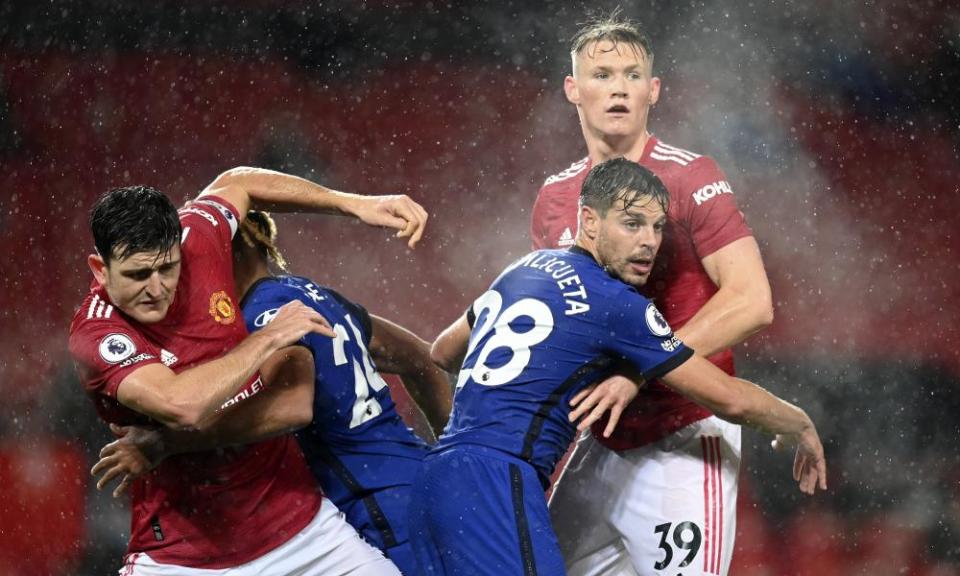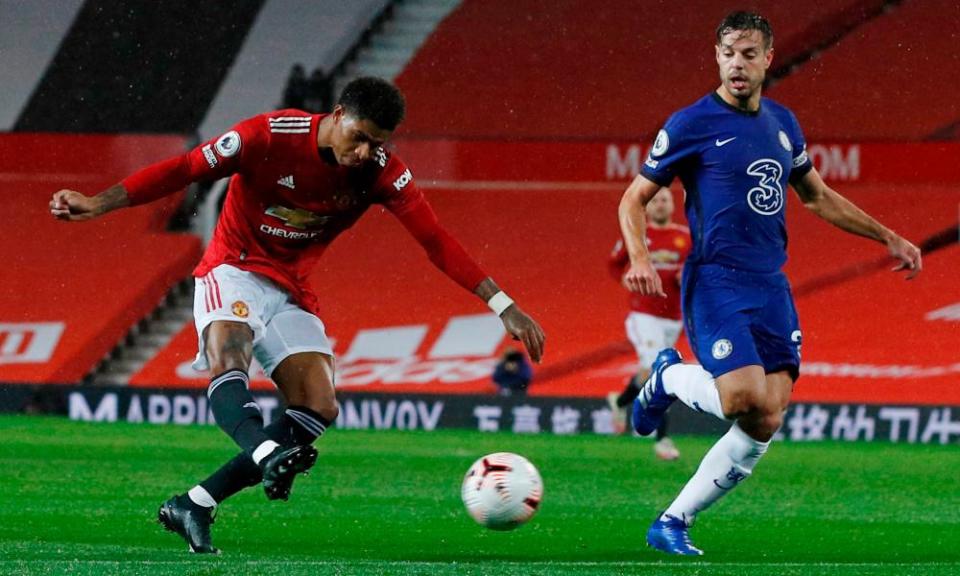Chelsea dig in to foil Manchester United in a game that felt out of time

Ole Gunnar Solskjær can do one big thing well, and that is sit his side deep and attack on the counter. Frank Lampard has one big thing he has struggled to do well, and that is set his side up to defend well against the counter. That’s why when these sides met at Old Trafford last season, Chelsea had 54% possession, won the shot count 18-10 and lost 4-0. Everything Lampard did on Saturday seemed aimed at avoiding a repeat.
Related: Mendy denies Rashford as Manchester United and Chelsea fail to find spark
And it worked. As in last season’s FA Cup semi-final, Chelsea set up with a back three, left no space behind their defensive line, and successfully thwarted United. At Wembley, individual errors from United players handed Chelsea victory; here the arm Harry Maguire hooked around César Azpilicueta’s neck should at the very least have handed them a penalty.
Personnel, of course, helps. Thiago Silva was a calm and authoritative figure at the heart of the back three, while Édouard Mendy made three very good saves. He looked lively, sharp and, crucially, didn’t radiate the sort of panic Kepa has recently. But having failed to keep an away clean sheet since December, this was at heart a tactical victory for Lampard. The next stage, as he acknowledged, is to add goals to successive clean sheets; given the quality Chelsea have in the front half of the team, that should come, even if it takes time to forge the sort of coordinated attacking patterns that characterise the very best sides.
To which there is one very obvious caveat: Solskjær’s United habitually struggle to break down teams who sit deep against them. It’ll be a long time before a goalless draw at Old Trafford ceases to be a decent result, and in context it has a specific value for Lampard, but it is not the prize it once was.
Solskjær’s results fit a pattern. United have won their last 10 away games in all competitions but none of their last five at home. This is why he has beaten Paris Saint-Germain twice at the Parc des Princes, why he has three wins against Pep Guardiola, why United were the only team to take league points off Liverpool until the end of February last season. He can organise the rearguard and United have the speed and talent up front to expose teams who operate high up the pitch.
But against teams who drop off, United are far less adept. That’s why home defeats to Crystal Palace feel just as emblematic of Solskjær’s reign as away wins against PSG. It’s why the defeat to Sevilla in the Europa League semi-final was so crushing: it wasn’t just that United had missed out on a European final, it was that they had done so in such a characteristic way, flailing hopelessly like Scrappy Doo meeting a longer-armed opponent able to keep him at bay with a calm hand on the front of his head – and that despite taking the lead.
Related: Frank Lampard makes case for the defence as forwards take back seat | Jacob Steinberg
The biggest tactical criticism of José Mourinho at Real Madrid from his own players was the way he left them to improvise in the final third: his refusal to do what Guardiola and Jürgen Klopp do and work relentlessly on attacking cohesion. Over the past decade, the ability to create cohesive attacking patterns has probably been the single biggest factor that distinguishes the very best coaches from the tier below. United have consistently failed to achieve that fluency.
In the first half of the first half, particularly, there were constant diagonals from Maguire, Fred and Scott McTominay aimed at the space in front of Daniel James. Except there was no space, because Chelsea had a deep-lying back five. Reece James advanced only rarely and when he did, Azpilicueta, as a regular right-back, was perfectly equipped to cover behind him.
The barrage did eventually stop, but it was replaced by safety-first sideways passing. Solskjær, never shy of appealing to romantic myth, spoke of how a full Stretford End might have sucked in Marcus Rashford’s late effort; more likely they’d have been groaning in frustration at the witlessness of much of what had gone before.

United created four meaningful chances: snapshots from Rashford and Juan Mata, a break by Rashford after a Jorginho error and Edinson Cavani’s improvised flick into the side-netting after some sharp movement. None of them were the result of coordinated play. Against diligent opponents, that can happen, but it is happening to United every time they meet a team that sits deep.
Related: Sergio Ramos penalty sets up Real Madrid's clásico victory over Barcelona
In that sense, this was a logical fifth step in the sequence. Solskjær had won his first three meetings against Lampard, who in the past two has found a way of correcting what had been going wrong before. Given Chelsea’s ongoing defensive issues and the fact United had let in nine in their previous two home games, the caution was understandable. The outcome was a game that felt oddly out of time, like a top-six clash from 15 years ago.
But given the wildness that has characterised the start to this season, the obvious risks of operating a high line with a lack of time properly to organise the press, it may be that more sides adopt a more traditional approach. There were specific reasons for the conservatism of both sides, but in a highly unusual environment, it could be a glimpse of a broader immediate future.

 Yahoo Finance
Yahoo Finance